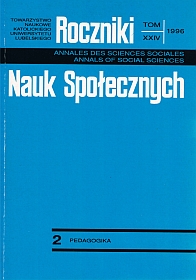Selektywność recepcji mass-mediów u młodzieży szkół średnich i środowiskowe czynniki kształtujące jej poziom
Abstrakt
The paper attempts at a „diagnosis” of the level of selectivity of the reception of a mass message in the youth of some selected secondary schools. At the same time the paper has taken into account the influence of traditional educative milieus (family, Church, school, peer groups), which could important in the shaping of a particular way in which youth used the mass media.
As a result, the analyses have established a low level of the selectivity of the media’s reception in the youth under study. This was expressed, among other things, in an excessive „dependence” on the media, especially such as the radio and television (young people often used these media without any greater constraints, sometimes at the expense of school duties, sleep or other tasks); in a consumptive type of content and programme interests (such entertainment contents are selected which do not call for reflection); in preferring and accepting, above all, those personality patterns which are most often promoted in the mass media (“laid-back” life style, “film star-like” attitude, being attractive as regards strength, appearance, material and social success, applause).
The level of the selectivity of the reception in the youth under study is modified by such variables as sex and type of school (comprehensive school children and girls show a higher level of criticism, e.g. when it comes to the knowledge of the mechanisms of dishonest dealings in the media), but to a greater extent by the influence (or negligence) in the family, school, during catechesis, and – directly – through contacts with peers. It turns out that it is just peers that have the greatest influence on the formation of content interest in youth, whereas the family and Church, which are given precedence by youth (especially comprehensive school students) as authorities, neglect their chance to shape in youth a critical reception of the mass media. Their negligence concerns both the elementary knowledge bout the media (within the framework of the Polish language instruction).
Final conclusions emphasize a need to act on two levels: 1) the research level – confronting the assumed educative goals with the actual level of youth’s knowledge, interests, and inclinations towards the values which are offered in the milieus traditionally forming and in the mass media, 2) a need to harmonize the formative influences in the milieus responsible for the formation of youth to make a proper use of the mass media. There is also a need to appropriately prepare parents, teachers and catechists.
Copyright (c) 1996 Roczniki Nauk Społecznych

Utwór dostępny jest na licencji Creative Commons Uznanie autorstwa – Użycie niekomercyjne – Bez utworów zależnych 4.0 Międzynarodowe.


